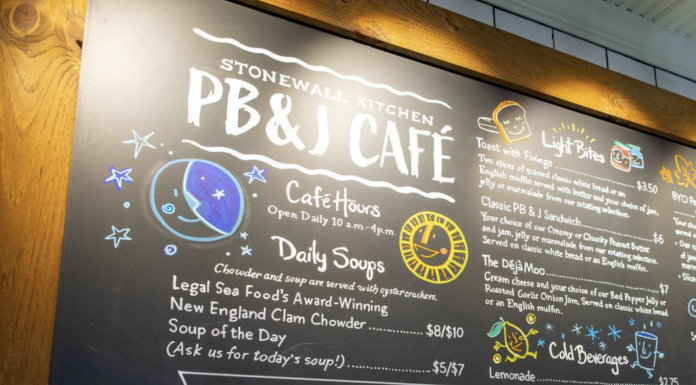
Nov 30, 2020
Boston Globe – Peanut butter and jelly are a perfect match, most would agree.
But the pairing of a new PB&J cafe and a children’s museum has sparked calls for quick separation.
The Boston Children’s Museum and an adjacent storefront and cafe responded to a cascade of comments this weekend from parents on Facebook, many expressing concerns that children with peanut allergies would be accidentally exposed to the eatery’s namesake dish: peanut butter and jelly sandwiches.
[Boston is also home to dozens of seafood restaurants – some within a block of the children’s museum –serving shellfish that can produce the same deadly allergic reaction, anaphylactic shock. No word yet on angry parents demanding they be shut down. – HH]
On Friday, Maine-based Stonewall Kitchen opened its latest location in the Fort Point neighborhood beside the museum. Within the store, which features home goods and specialty foods, the company also opened the PB & J Café, where a variety of the sandwiches can be purchased to-go.
Museum officials wrote on Facebook:
“We are thrilled to announce that Stonewall Kitchen‘s new PB & J cafe is NOW OPEN inside the Boston Children’s Museum building! Come on in for delicious bites and refreshments — the perfect pairing after a trip to the Museum!”
But parents on the museum’s Facebook page were quick to call out the decision to allow the cafe, citing the risks involved for children with mild to severe peanut allergies.
“This is the dumbest decision ever,” one parent wrote. “Guess we’ll be visiting the children’s museum in Providence instead. Completely short-sighted decision.”
After receiving hundreds of comments — many from aggrieved parents — museum officials posted a statement Saturday to assuage their fears.
“The safety and wellbeing of all children is our top priority,” museum officials wrote. “Stonewall Kitchen is an independent company, and separate from the Museum space . . . It’s important to note that no food of any kind is allowed in the Museum exhibit halls. We understand this may not allay all of your fears, but we are committed to your safety and will continue to monitor this over the coming weeks.”
The message included a lengthy statement from Stonewall Kitchen about its food offerings, which are made with artisan jams and jellies … Read more.
If we’re going to ban peanut butter, we’ll have to ban lobster, shrimp, oysters, and crab as well:
“In severe cases, shellfish allergy can lead to anaphylaxis, a dangerous allergic reaction marked by a swollen throat (airway constriction), rapid pulse, shock, and dizziness or lightheadedness. Anaphylaxis can be life-threatening.” – Mayo Clinic, Jun 19, 2020
Boiled Peanuts May Be the Key to Curing Peanut Allergies
Could boiling peanuts cure peanut allergy?
By Daniel More, MD
Medically reviewed by a board-certified physician | Updated on June 24, 2019
Verywellhealth.com – The rate of peanut allergy has dramatically increased over the last 10 years and now affects one to two percent of the population in the United States and other Westernized countries.
Severe, life-threatening allergic reactions to peanuts are common in people with peanut allergy and have resulted in dozens of deaths over the past 15 years.
In other parts of the world, such as Korea, China, and Israel, the rate of peanut allergy is much lower than that of Westernized countries. Some researchers think that the lower rate of peanut allergy in these countries might have to do with how peanut is processed.
In Westernized countries, peanuts are commonly dry roasted; in non-Westernized countries, however, peanuts are often boiled, fried or even pickled. These different forms of processing likely alter how a body reacts to the peanut allergen.
How Processing and Cooking Changes Peanut Allergy
There are 3 major peanut allergens that have been described, called Ara h 1, Ara h 2 and Ara h 3.3 People living in the United States (U.S.) with peanut allergy most commonly are allergic to Ara h 2, especially those people with the more severe forms of peanut allergy. It appears that the major peanut allergens are altered by how peanuts are processed when compared to raw peanuts.
Roasting peanuts enhances how IgE antibodies react to Ara h 2, which could explain why people in the U.S. tend to have more common and more severe allergic reactions to peanuts.
On the other hand, roasted peanuts are rarely eaten in Korea, where it is more common to eat pickled, boiled or fried peanuts, which seems to reduce the ability of Ara h 2 to act as an allergen.
For this reason, it’s likely that peanut allergy, especially severe forms, tend to be more common in Westernized countries compared to Asian countries.
Is There Currently a Cure for Peanut Allergy?
Not really. There are a number of small studies focusing on the use of oral immunotherapy for the treatment of peanut allergy … Read more.
RECENTLY:
Breakthrough in Finding A Cure for Peanut Allergy
ALSO ON HEADLINE HEALTH TODAY: China-Owned Pork Giant Wants To “Share” Freezer Space With Vaccines | CRAB Bug Infects ICUs | Truckers: Put Us At Head Of Line For Vaccine



